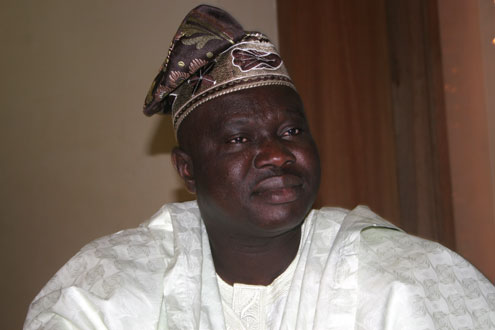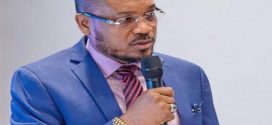A Federal High Court, Lagos Monday fixed July 11, 2014 for ruling on a no-case submission filed by the Speaker of the Lagos State House of Assembly, Adeyemi Ikuforiji, against his trial by the Economic and Financial Crimes Commission (EFCC) over alleged money laundering.
The trial judge, Justice Ibrahim Buba, fixed the date after taking the submissions of Chief Wole Olanipekun (SAN), who is representing Ikuforiji on the matter.
Ikuforiji is being prosecuted alongside his aide, Oyebode Atoyebi, on an amended 56- count charge bordering on money laundering.
They had however pleaded not guilty to all the charges, while Justice Buba had granted them bail in the sum of N1 billion each with two sureties each in like sum.
In the charge, the accused are being alleged to have committed the offence between April 2010 and July 2011.
They are being alleged to have committed an illegal act of accepting cash payments of over N273 million from the House of Assembly without going through a financial institution.
The offence is said to contravene the provisions of section 18(a) of the Money Laundering (Prohibition) Act 2011.
But in his no-case submission after the defence had closed their case, Olanipekun argued that the prosecution had not in any way made out a case against the accused to warrant Ikuforiji entering the dock to open his defence.
Relying on several authorities, the defence counsel argued that the office of a speaker of House of Assembly of a state was constitutionally created, and so, by parity of reasoning, the first accused is sovereign as presently constituted. He noted that the charge against the accused largely borders on dealing with funds above the amount or limit stipulated by the Money Laundering Act, and not necessarily whether the transactions were in cash or not.
According to Olanipekun, the accused had not been involved in any transaction within the contemplation of the Act, since all funds collected on his behalf, were based on requisition notes, which were approved and handed over to banks, before cash was received.
The counsel, who formulated several issues for determination, ranging from constitutional and jurisdictional to the sovereignty of the office of the speaker, observed that if the monies collected on behalf of the Assembly were actually drawn from a financial institution, then the issue of exceeding threshold no longer exist as that would amount to a circus.
He said that the National Assembly would not have contemplated, by the enactment of the Act, that the accused, who had only obtained funds officially for the benefit of the Assembly, would now stand trial for performing his official duties.
He further argued that the 2004 Act, under which the accused was charged, had since been repealed by a subsequent legislation of 2011, adding that the effect of repealing a statute is simply to discountenance it as though is never existed.
Olanipekun also noted that the failure of the prosecution to demonstrate elements of conspiracy between the accused persons also shows the futility of the proceedings before the court.
He enjoined the court to decide whether it is possible within the tenure of the Assembly, for the accused to be charged for dealing with funds approved for official reasons. According to the SAN, even the evidence of PW 2 attested to the fact that all the funds obtained for the benefit of members of the Assembly, were legally approved.
He therefore, submitted that the prosecution had not made out any case against the accused, for which he is expected to enter a defence.
Aligning himself with the submissions of Olanipekun, counsel to the second accused, Mr. Tunde Akinrimisi, submitted that the evidence of the first prosecution witness (PW1) was inconclusive and based on a mere hearsay, adding that the court cannot act on such unfounded allegations.
Responding to the submissions of the defence counsel, the prosecuting counsel, Chief Godwin Obla (SAN), urged the court to disregard the arguments of Olanipekun and order the accused persons to open their defence.
Obla argued that the confessional statement of the accused before the EFCC is enough evidence on their admission of having transacted with cash of the Assembly, about 57 times.
He maintained that the provisions of the Act clearly make it an offence for any individual or institution to transact with funds above the stipulated threshold, without going through a financial institution.
Citing the provisions of the Halsbury Laws of England, Obla argued that the accused is not covered by any immunity, adding that the self-accounting Laws of Lagos State does not preclude officers from complying with the Money Laundering Act.
He stressed that although the 2004 statute had been repealed, the 2011 enactment provides that such repeal shall not affect anything done or purported to be done pursuant to that Act.
Citing the case of Patrick Njovens vs. State, Obla submitted that in establishing the element of conspiracy, it was not necessary for the accused to be seen coming out from the same location “like those who murdered Julius Caesar.”
He therefore, urged the court to disregard the application of the defence counsel, and order the accused to open their defence.
 Hottestgistnaija.com
Hottestgistnaija.com





